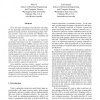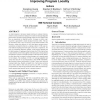45 search results - page 5 / 9 » A correct and useful incremental copying garbage collector |
IWMM
2010
Springer
13 years 11 months ago
2010
Springer
Concurrent and incremental collectors require barriers to ensure correct synchronisation between mutator and collector. The overheads imposed by particular barriers on particular ...
RTCSA
2007
IEEE
14 years 1 months ago
2007
IEEE
Given the major advantages of productivity and safety, the use of garbage collection (GC) in real-time systems has gained increasing attention. Guaranteeing garbage collection act...
OOPSLA
2004
Springer
14 years 29 days ago
2004
Springer
As improvements in processor speed continue to outpace improvements in cache and memory speed, poor locality increasingly degrades performance. Because copying garbage collectors ...
IWMM
2009
Springer
14 years 2 months ago
2009
Springer
: © Garbage Collection in the Next C++ Standard Hans-J. Boehm, Mike Spertus HP Laboratories HPL-2009-360 C++, garbage collection C++ has traditionally relied on manual memory mana...
OOPSLA
1997
Springer
13 years 11 months ago
1997
Springer
A new garbage collection algorithm for distributed object systems, called DMOS (Distributed Mature Object Space), is presented. It is derived from two previous algorithms, MOS (Ma...


